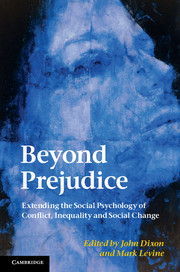Book contents
- Frontmatter
- Contents
- Figures
- Tables
- Contributors
- Acknowledgements
- Introduction
- Part I Beyond prejudice
- 1 From perception to mobilization: the shifting paradigm of prejudice
- 2 Prejudice, social identity and social change: resolving the Allportian problematic
- 3 An ambivalent alliance: hostile and benevolent sexism as complementary justifications for gender inequality
- 4 Prejudice and dehumanization
- 5 Stereotyping, prejudice and discrimination revisited
- 6 Beyond ‘old’ and ‘new’: for a social psychology of racism
- 7 The notion of ‘prejudice’: some rhetorical and ideological aspects
- 8 The prejudice problematic
- 9 Implicit prejudice in mind and interaction
- 10 Rethinking the prejudice problematic: a collaborative cognition approach
- Part II Prejudice and social change revisited
- Index
- References
2 - Prejudice, social identity and social change: resolving the Allportian problematic
from Part I - Beyond prejudice
Published online by Cambridge University Press: 05 June 2012
- Frontmatter
- Contents
- Figures
- Tables
- Contributors
- Acknowledgements
- Introduction
- Part I Beyond prejudice
- 1 From perception to mobilization: the shifting paradigm of prejudice
- 2 Prejudice, social identity and social change: resolving the Allportian problematic
- 3 An ambivalent alliance: hostile and benevolent sexism as complementary justifications for gender inequality
- 4 Prejudice and dehumanization
- 5 Stereotyping, prejudice and discrimination revisited
- 6 Beyond ‘old’ and ‘new’: for a social psychology of racism
- 7 The notion of ‘prejudice’: some rhetorical and ideological aspects
- 8 The prejudice problematic
- 9 Implicit prejudice in mind and interaction
- 10 Rethinking the prejudice problematic: a collaborative cognition approach
- Part II Prejudice and social change revisited
- Index
- References
Summary
The world as a whole suffers from panic induced by rival ideologies of east and west, each corner of the earth has its own special burdens of animosity. Moslems distrust non-moslems. Jews who escaped extermination in Central Europe find themselves in the new State of Israel surrounded by anti-Semitism. Refugees roam inhospitable lands. Many of the colored people of the world suffer indignities at the hands of whites who invent a fanciful racist doctrine to justify their condescension.
Allport (1954, p. xiii)It requires little imagination to identify the similarities between current events and this description offered by Gordon Allport in the preface to his seminal 1954 text, The Nature of Prejudice. In the same opening pages, Allport also expresses his optimism that psychological science will ultimately be able to shed light not only on matters of ‘material progress’ but also on issues of human nature and social relationships that might help understand the factors that are responsible for both hatred and tolerance (p. xiv). Yet at the same time as arguing that this scientific study of social relations should be possible, he states that it ‘required years of labor and billions of dollars to gain the secret of the atom. It will take a still greater investment to gain the secrets of man’s irrational nature’ (p. xv). And, as a final reflection, he notes that it ‘is easier, someone has said, to smash an atom than a prejudice’ (p. xv).
There is no doubt that the issue of prejudice has consumed many minds and research budgets in the intervening five decades since Allport expressed these views. But what progress has been made? What are the obstacles to progress? And are we yet at a point of knowing how to ‘smash a prejudice’? More significantly, perhaps, we might ask whether Allport’s goal was realistic and whether it ever will be.
- Type
- Chapter
- Information
- Beyond PrejudiceExtending the Social Psychology of Conflict, Inequality and Social Change, pp. 48 - 69Publisher: Cambridge University PressPrint publication year: 2012
References
- 12
- Cited by



